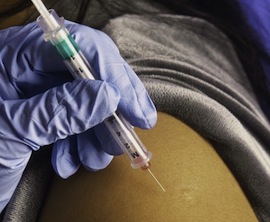
The Holy Grail of many drug researchers—a vaccine for addiction—has a spotty history so far. But a recent approach to measuring a vaccine’s effectiveness may one day make it easier to determine how well your cocaine-vax shot is working. A problem with addiction vaccines is the difficulty of obtaining objective chemical evidence that they’re actually doing what they’re supposed to do: keeping cocaine molecules out of your brain. “We thought it would be nice to demonstrate objective evidence that the vaccine is actually working,” a Cornell University researcher drily notes. Scientists at Cornell say they’ve designed a “molecular probe” that resembles the cocaine molecule, and binds to the same dopamine receptors as cocaine. Using PET scans to keep track of the probes, Shankar Vallabhajosula of Weill Cornell Medical College reports that his team observed the brains of both vaccinated and unvaccinated rhesus monkeys as they were dosed with cocaine. The molecular probe accumulated strongly in the brains of vaccinated monkeys, but in monkeys without the vaccine, the accumulation was low—because the receptors were already packed full of cocaine molecules. The PET imaging technique would definitely make it easier to fine-tune dosage, and track the vaccine as it circulates through the body. But the work on this vaccine tracker has not yet appeared in a peer-reviewed journal, and the vaccine itself is still under development at Weill Cornell Medical College. And even a successful vaccine, successfully tracked, wouldn’t protect against cocaine’s side-effects on the heart and circulatory system.
